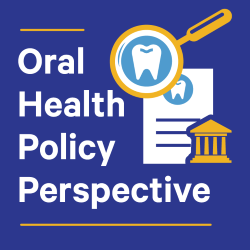Enter your email to receive the CareQuest newsletter:
August 29, 2025
By Caroline Le, CareQuest Institute Public Policy Analyst, Kasey Wilson, MSW, Senior Policy Analyst, Dental Access Project, Community Catalyst, and Bailey Reavis, Senior Manager of Government Affiars, Families USA

More than 78 million people rely on Medicaid for their health care — about one in five people living in the US. The program is also a critical lifeline to dental care for people with disabilities, children, older adults, and families with low incomes. Medicaid is the largest source of federal funding to states, helping to stabilize state budgets and promote health and economic security for families by keeping people in school, working, and out of medical debt.
The One Big Beautiful Bill Act (OBBBA), passed on July 4, 2025, included deep cuts to Medicaid that will have lasting impacts, including on oral health care. Now is a critical time for advocates to understand how these Medicaid cuts will affect oral health access and to take action to mitigate the impact on families likely to lose affordable care.
OBBBA Medicaid Provisions that Impact Oral Health Access
Twenty-three million adults get their dental coverage through Medicaid, but new provisions put this access at risk. Eligibility changes could result in millions losing their Medicaid coverage entirely. Medicaid adult dental benefits (MADB) are optional, and states are not required to cover them. This means they are often the first benefit states cut when they face budget pressures. The provisions in OBBBA that are likely to impact oral health access include:

1. New work requirements and eligibility redeterminations will result in unnecessary loss of coverage. Frequent eligibility redeterminations and work requirements are among the first policies set to take effect. These measures are proven to be unnecessary and burdensome, pushing eligible people off Medicaid coverage through bureaucratic hurdles. As a result, eligible families will lose access to their health and dental coverage, posing one of the biggest risks to access to dental care. Changes in the bill include:
- Requiring states to implement community engagement requirements: Adults covered through Medicaid expansion must report at least 80 hours per month of work, school, or other “community engagement” activities at least once every six months — or more often if required by their state.
- By June 2026, the US Department of Health and Human Services Secretary must issue interim final rules to implement the new work reporting requirements. Within seven months of rule issuance, states must design, test, and launch their programs. States may request a waiver for delayed implementation (up to January 2029) if they demonstrate a good faith effort to comply. - Requiring Medicaid expansion populations to redetermine eligibility every six months starting January 1, 2027
While there are some technical exceptions for children, pregnant people, people with disabilities, and certain hardship cases, history shows that they may still lose coverage through burdensome verification processes. Those processes are projected to result in millions of people being disenrolled from Medicaid and losing their premium tax credit eligibility in the marketplace.
2. Cuts to provider taxes threaten adult dental benefits. Provider taxes are a critical financing tool for states. Without flexibility to raise provider taxes — and with many states losing revenue due to required reductions in those taxes — states will have fewer dollars to maintain optional benefits. This makes adult dental benefits especially vulnerable.
Changes in the bill include:
- Freezing provider taxes at current levels, disallowing increases in any new or existing taxes
- Phasing down the safe harbor limit, the maximum tax rate states can charge without penalty, from 6% to 5.5% starting in FY 2028, and then down to 3.5% in FY 2032
For a full timeline of when key Medicaid OBBBA provisions will go into effect, see this timeline.
Why This Matters for Oral Health
History has shown that loss of coverage impacts access to dental care, emergency room (ER) use, and overall health system costs:
- In Oregon, California, Maryland, and Pennsylvania, eliminating MADBs led to increased dental ER visits and increased costs of care overall because an ER visit costs three times more than a dental visit.
- In Missouri, California, and Massachusetts, MADB cuts shifted costs to community health centers, straining their capacity and financial stability.
- In Massachusetts, private practice dentists experienced a drop in revenue because they had provided the majority of dental care for adults with Medicaid.
Cuts to dental coverage will worsen already severe barriers to oral health and carry major economic consequences. More than 72 million adults in the US currently lack dental insurance, and dental care is already one of the most expensive health services for individuals. Without coverage, more families risk dental debt or delaying care until problems become emergencies. Access to dental coverage through Medicaid also supports employment, contributing to both personal financial security and the stability of the broader economy.
Despite these deep cuts to Medicaid, advocates can take action to help mitigate the impacts. Now is the time to engage with state and federal policymakers to delay or offset potential state budget cuts, minimize coverage losses, and protect adult dental benefits. Here is a helpful tool to see current Medicaid adult dental coverage by state and illustrate what these cuts could mean nationwide. If these changes cannot be further delayed and do take effect, advocates can also support and educate providers and families as they navigate eligibility changes to help as many people as possible maintain coverage and access to care.